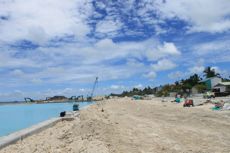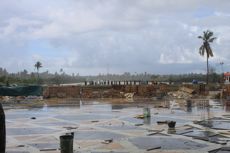The Maldives has expressed support for electronic voting systems in India and Pakistan, and is taking steps to introduce Electronic Voting Machines (EVMs) to its own electoral process.
At an informal meeting of Electoral Commissioners from SAARC member countries in India, the Maldives joined Bhutan, Afghanistan, Nepal and Sri Lanka in praising India’s use of EVMs and indicated that “legal amendments would be thought of to see that EVMs were made popular to ensure free and fair polls in their countries,” Indian news outlet The Hindu reported yesterday.
Commissioners met to discuss Afghanistan’s voting procedures in light of waning financial and other aid from NATO allies.
Maldives Elections Commission President Fuad Thaufeeq said the commission, which is developing a proposal for Parliament regarding EVMs, has met with the Committee on Independent Commissions to discuss their implementation.
“So far, we have been getting information from many countries in Europe, South America and Asia which have used these. Regionally, India, Nepal, and Bhutan have used the machines and we are also getting advice from them. Hopefully the system will work, but some laws will have to be changed and the public must support the decision,” said Thaufeeq.
Prior to the 2008 Presidential election, India had offered to donate several hundred EVMs to the Maldives. “But it was the wrong time,” said Thaufeeq. “The machines India was using could not do print-outs. This year, they upgraded and added a verification process. I think it’s necessary for the Maldives to have a verification system,” he said.
Thaufeeq indicated that the commission may approach India’s High Commission to renew their offer of donations. Otherwise, he said machines will be chosen through a negotiation process with various companies, and bids may be solicited.
Electronic and internet voting systems have been used worldwide for decades, and have triggered much debate.
India first used electronic voting machines in 1982; in 2002, they became an election standard nation-wide. However, India’s 2009 elections were discredited when Omesh Saigal, an IIT alumnus and IAS officer publicly proved that the electronic voting system may have been rigged.
In 2006, the Netherlands’ General Intelligence and Security Service proved that electronic voting machines could be eavesdropped from up to 40 metres. EVMs were subsequently eliminated.
Since the 2000 presidential election, the United States has reported problems with electronic voting machines in a number of local and national elections. Mis-punched cards, security flaws, and touch screen malfunctions were some factors that have tipped votes over the past decade.
Internet voting was proposed for the Maldives’ Parliamentary elections as a means of cutting costs and confusion for Maldivians living abroad. Project Coordinator at NGO Transparency Maldives Aiman Rasheed said the motion was swiftly rejected by Parliament, and although Transparency has not been officially informed of the discussion, doubts that EVMs will be treated differently.
Observing that EVMs are acceptable under the right conditions, Rasheed explained that the advantages of using EVMs in the Maldives did not justify the disadvantages.
“In a large country with dense population centers, they can be useful,” he said. “But the Maldives is so small, and population areas are so widely spread out, with only 400 polling stations I don’t think that they would be a major improvement.”
Rasheed said the disadvantages of EVMs could have a significant political impact, and believed the public should be involved in the decision.
“I think Parliament and the Elections Commission should carefully consider the cost-benefit. Is the quick count worth the room that the new system with EVMs would leave for accusations of fraud or lack of transparency?” he said, noting that Maldivians tend to have a high “trust deficit”, and pointing out that Maldivian law does not allow for exit polls.
Building public trust is driving the dialogue over EVMs in the Maldives. Dhivehi Rayyithunge Party (DRP) Deputy Leader Ibrahim ‘Mavota’ Shareef agreed with Rasheed’s assessment.
“There is a lot of suspicion about new innovations that people are not familiar with. If done correctly, and people are informed, then EVMs shouldn’t be a problem for democracy in the Maldives,” he said.
However, Shareef observed that “any electronic machine with passwords can be corrupted,” adding that corruption is a higher risk for small communities. He recommended the Elections Commission “prove it cannot be manipulated” by issuing public education programs through the media.
“There is no public participation in the Election Commission’s discussion right now. Many islanders are unaware of how these things work. Without building trust, there will always be suspicion,” he said.
Rasheed explained that the “trust deficit” was a symptom of a young democracy.
“The Maldives’ biggest issue is that it has only had three free elections, and those were very recent. The latest Parliamentary and Presidential elections did very well under the circumstances, but the local elections have definitely declined in terms of transparency.”
Rasheed said that during these elections, political parties and NGOs sent volunteers to observe the electoral process, promoting transparency. Although new legal framework was implemented a mere one-and-a-half months prior to the Presidential election, and three months prior to the Parliamentary elections, “they did quite well,” said Rasheed.
Local elections, which had 18 months to prepare, performed well administratively “but they did not do so well in terms of transparency,” said Rasheed.
MDP MP Eva Abdulla also believes that free, transparent elections must be routinised before electronic modifications are made to the electoral process.
“I’m not sure if we are willing to move away from the physical voting system. It’s only been three years since we began trusting independent voting procedures,” she said.
Abdulla believes that Maldivians are quick to absorb new technology, but doubts that the advantages of EVMs are relevant to the Maldives.
Previously, island geography meant that counting and recording votes could take several days. “Now, officials count the ballots in front of the people on the same day, and we have our results immediately,” said Abdullah.
The Elections Commission has a different impression of the situation.
According to Thaufeeq, the average five to six hours that manual voting procedures involve is too long, and the costs of employing workers to manage the polls is too high. He said that while the transparency of open counting is important, there are significant advantages to electronic voting.
“Responses from MPs and the general public has indicated that people are more ready today than they were three years back. People are more familiar with technology right now, an EVM is similar to an ATM, which everyone can use,” said Thaufeeq. “But above all, we want the approval of Parliament and the public, to be sure that everyone is aware and comfortable with the system.”
Public examinability of voting procedures has been identified as an essential factor of free elections by government and independent groups worldwide.
In 2007, California Secretary of State Debra Bowen commission a statewide “Top to Bottom review” of electronic voting systems. According the report, every mechanism contained at least one security flaw that would allow a single non-expert to compromise an entire election.
In 2009, the Federal Constitutional Court of Germany found that when using voting machines the “verification of the result must be possible by the citizen reliably and without any specialist knowledge of the subject.”
Although the Maldives’ plans for implementing EVMs are far from concrete, the sentiments behind the suggestion are strong.
“Historically, the Maldives has had close elections with little information, which has generated suspicion of fraud,” Rasheed said. “If people can’t see what is happening, it will feed the country’s rising trust deficit.”
Likes (0)Dislikes
(0)Dislikes (0)
(0) 


